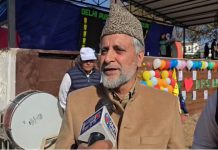Kashmiri Pandits body moves SC supporting abrogation of Article 370
An organisation representing Kashmiri Hindus, the Youth 4 Panun Kashmir, on Thursday filed an intervention application (IA) before the Supreme Court supporting the Central government’s 2019 decision to abrogate Article 370 of the Constitution.
The organisation urged the Supreme Court to dismiss all petitions pending before the top court challenging the Central government’s decision to delete Article 370, which had earlier granted special status to the erstwhile State of Jammu and Kashmir.
Also Read: Jammu & Kashmir: Education dept bans corporal punishment in schools
Article 370 and 35A were the biggest reason for the lack of psychological integration of the erstwhile State of Jammu & Kashmir with the rest of India and became a breeding ground for separatist ideas leading to the ethnic cleansing of innocent Kashmiri Pandits,” the application stated.
The application, filed through advocate Siddharth Praveen Acharya, also urged the top court to recognise the atrocities committed against Kashmiri Pandits and the inaction of the Central and State governments in this regard.
Since the abrogation of Article 370, “targeted killings of Hindus” have increased in Jammu and Kashmir, the organisation highlighted.
The applicant argued that Article 370 had contravened the fundamental rights of Kashmiri Pandits, who stood to lose their permanent residency benefits if they married from outside the State under the earlier regime.
The plea also pointed out that the Ranbir Penal Code (RPC), which is applicable to Jammu and Kashmir, has provisions that were different from the Indian Penal Code applicable to the rest of the country.
Referring to the Supreme Court’s judgment decriminalising gay sex, the applicant added,
“This verdict of the Hon’ble Supreme Court had not been welcomed by the erstwhile State of Jammu & Kashmir for the very reason that the Indian Penal Code was not applicable”.
Further, the RPC had allowed for mass drills towards training on use of firearms, the organisation contended.
The applicant further emphasised that the move to abrogate Article 370 was completely lawful and within constitutional parameters. Therefore, the petitions challenging this move should be dismissed, the organisation prayed.
A Constitution Bench of the Supreme Court is slated to start hearing the batch of petitions challenging the abrogation of Article 370 of the Constitution from August 2. The Court has decided to hear the case on a day-to-day basis, except on Mondays and Fridays.
That development came nearly four years after the abrogation of Article 370 of the Constitution.
Over 20 petitions are pending before the apex court challenging the Central government’s decision to abrogate Article 370 of the Constitution, which resulted in the revocation of Jammu and Kashmir’s special status. The erstwhile State was subsequently bifurcated into two Union Territories.
When the matters were last listed in March 2020, a five-judge Constitution Bench decided not to refer the batch of petitions to a seven-judge Constitution Bench, despite some petitioners seeking a reference.
The petitioners had argued that two Supreme Court judgments – Prem Nath Kaul v. State of Jammu & Kashmir and Sampat Prakash v. State of Jammu & Kashmir – which were rendered by five-judge benches and dealt with the interpretation of Article 370, were in conflict.
However, the five-judge bench that was hearing the case declined to refer the matter to a larger bench, stating that there was no conflict between the two judgments.
Meanwhile, the Union Home Ministry filed a fresh affidavit recently, stating that after the abrogation of Article 370, Jammu and Kashmir has witnessed unprecedented stability and progress, with stone pelting and school closures becoming a thing of the past.
However, the Supreme Court had said that the same does not have any bearing on the constitutional questions involved in the matter.




